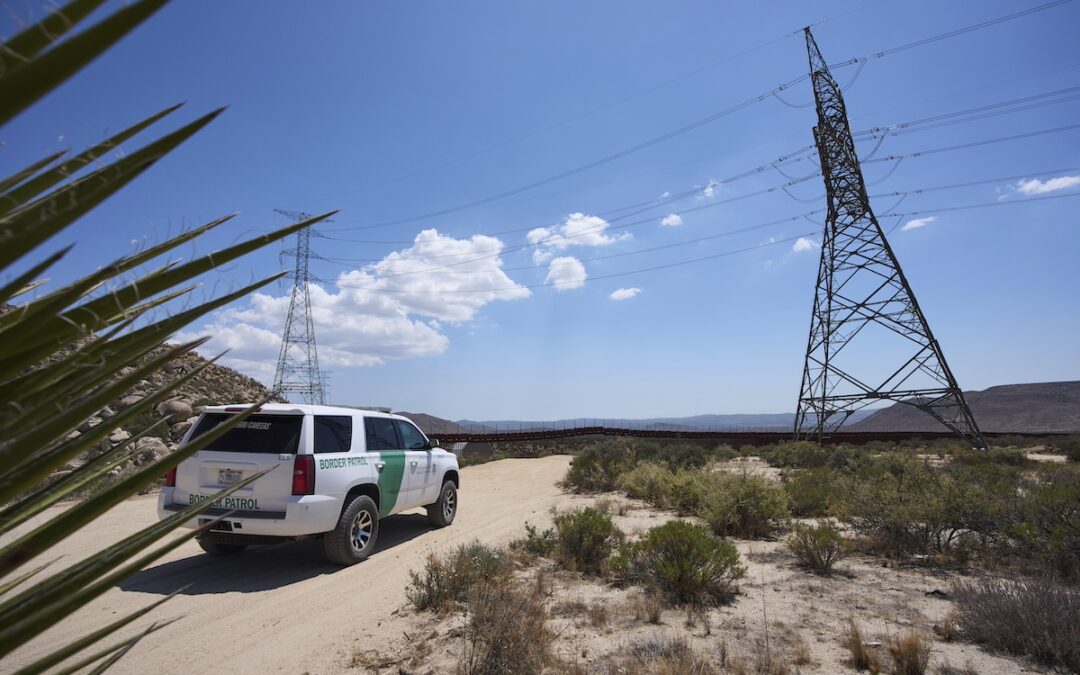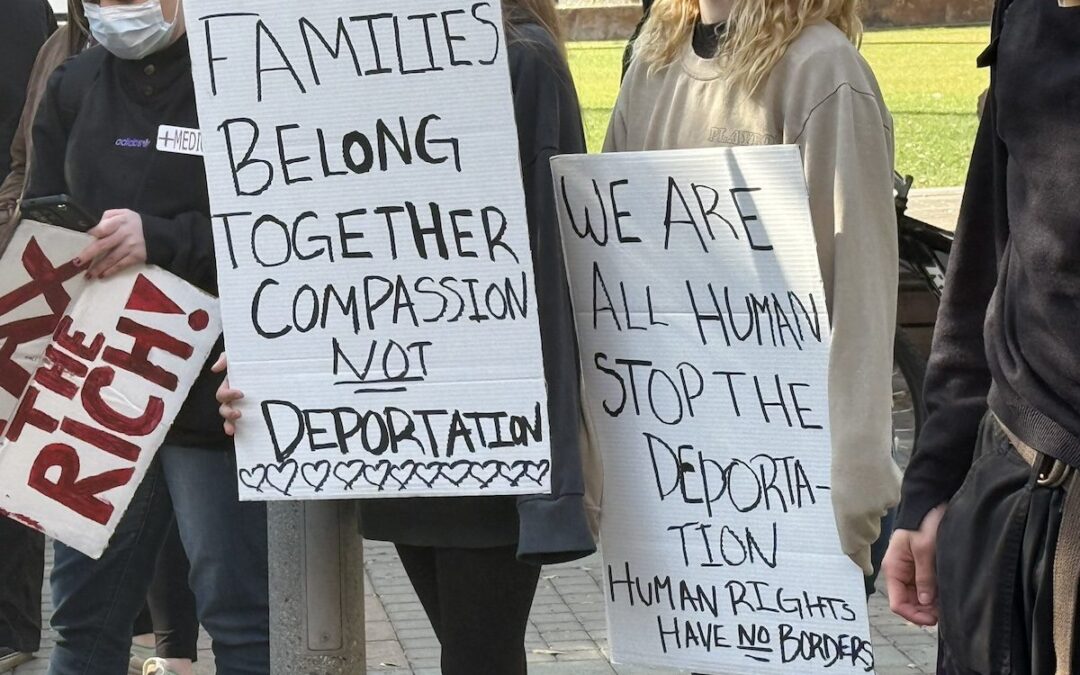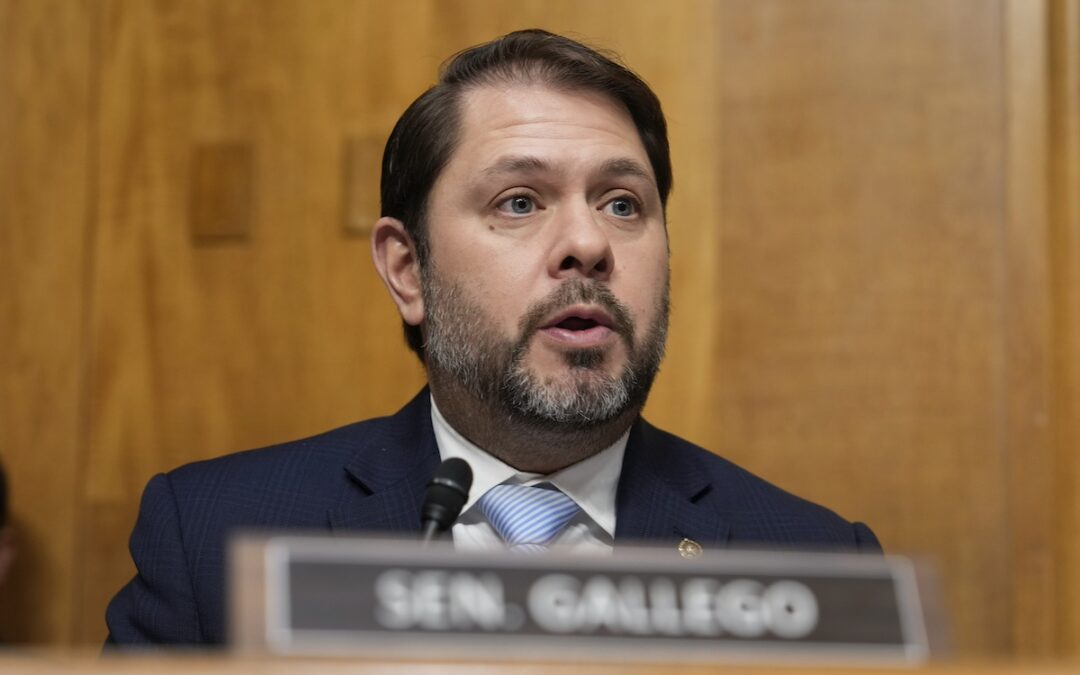
Peruvian immigrant family members, who are seeking asylum in the United States, embrace as they wait to board a bus during processing by U.S. Border Patrol agents in the early morning hours after crossing into Arizona from Mexico. Photo by Mario Tama/Getty Images.
Arizona voters overwhelmingly approved a proposition to expand police powers over any person they suspect entered the country unlawfully and empower state judges to order deportations.
Proposition 314 gives state law enforcement authority to arrest anyone they suspect has entered the country outside authorized ports of entry and declares crossing the border anywhere outside a port of entry to be a state crime. It also classifies the crime as a felony with much more severe sentences than that at the federal level, where unauthorized border crossings are treated as misdemeanors.
It creates stricter requirements and penalties for businesses that employ immigrants, grants law enforcement and government bodies blanket immunity from civil lawsuits that might result from enforcement of the law, and sets harsher penalties against anyone convicted of knowingly selling fentanyl that causes deaths.
It does not provide funding for its mandate that local authorities enforce border crossings – which is estimated to be $325 million annually for Arizona taxpayers and cost the state’s prison system $50 million every year.
The measure will also require state and local agencies to check someone’s legal status in addition to what is already required by federal law before they can qualify for public benefits, and will further criminalize submitting false paperwork for employment or public benefits, such as healthcare.
The measure was put on the ballot by Republican lawmakers and drafted with the help of the Arizona Sheriff’s Association.
The proposition has gained overwhelming support from voters, receiving over 1.54 million votes as of Friday afternoon—outpacing every statewide candidate, including Trump, but not quite as popular as the Arizona Abortion Access Act.
Misleading description of Prop 314
Aliento, a community group that provides resources to undocumented Arizonans and mixed-status households, talked to over 50,000 voters — and at the polls, they were hearing from people that they thought the bill only created more obstacles for fentanyl to enter the US – not that it had negative implications for immigrants.
The measure includes the creation of a felony for selling fentanyl that leads to an overdose death — but, it is nearly impossible to actually convict someone for murder over selling fentanyl.
The information put out about the proposition didn’t convey the full consequences of it, according to Aliento founder and CEO Reyna Montoya. People didn’t have the right information, and there wasn’t enough time for Aliento and other voter outreach groups to educate voters on the real implications of the measure.
“If you were a voter who works nine to five, maybe has two jobs and is working really hard to provide for their family and they only read the description of what was on the ballot,” Montoya explained. “You would think that this was going to protect [from] fentanyl.”
People have real concerns about the fentanyl crisis in the US, and the national rhetoric from the now president-elect that immigrants are the cause of every single thing that is wrong in society doesn’t help, Montoya said.
The original bill made its way through the legislature quickly, only received a hearing in the Senate — and was pushed to become a concurrent resolution, a process that voters often do not understand.
There were only a few months to educate millions of voters on the negative effects of the proposition, Montoya said.
What happens next
Its passage comes as President-elect Donald Trump’s mass deportation plan takes shape. He has promised to carry out the “largest deportation operation in American history,” and use militarization for a “border crackdown.”
It is still not guaranteed that the border-crossing provision will become law, which cannot be enforced until a similar anti-immigration law in Texas has been in effect for 60 days. That law, known as Senate Bill 4, is currently being challenged in court for conflicting with federal immigration law.
In Arizona, the proposition has been widely seen as a way the Republican-controlled legislature was able to bypass the state’s Democratic governor and get the bill out to voters, who correctly predicted would pass the measure.
Texas’ SB4 made it a crime under state law to enter the country illegally and gave local law enforcement the authority to arrest those they believe are in the country illegally, along with giving state judges the power to deport immigrants.
The US Department of Justice is arguing that constitutionally-granted federal authority over immigration enforcement, namely deportation, takes precedence over state enforcement, and it could take years for this to make it out of court. It is also possible that the DOJ could drop the case when Trump takes office in January, which allows SB4 to go into effect in Texas immediately, and enforcement of Prop 314 to begin as early as April.
Immigrants’ rights groups like Aliento and Living United for Change in Arizona (LUCHA) have called the proposition unconstitutional and have promised to fight it in court. They believe the powers it grants local law enforcement could lead to widespread racial profiling.
LUCHA previously filed a lawsuit to prevent the initial bill passed by Republican lawmakers in the state legislature from making it to the ballot, but it was later rejected by the Arizona Supreme Court.
Once the election results are certified and Prop 314 becomes law, the state will be open to lawsuits that could delay it going into effect or have it thrown out entirely.
Support Our Cause
Thank you for taking the time to read our work. Before you go, we hope you'll consider supporting our values-driven journalism, which has always strived to make clear what's really at stake for Arizonans and our future.
Since day one, our goal here at The Copper Courier has always been to empower people across the state with fact-based news and information. We believe that when people are armed with knowledge about what's happening in their local, state, and federal governments—including who is working on their behalf and who is actively trying to block efforts aimed at improving the daily lives of Arizona families—they will be inspired to become civically engaged.


US Border Patrol is increasingly seen far from the border as Trump ramps up deportation arrests
McALLEN, Texas (AP) — Immigration arrests seen on video are showing an emerging trend: More Border Patrol agents are doing their jobs far from the...

Arizona high school athletes contend with immigration uncertainty in their communities
PHOENIX – While President Donald Trump’s decision to deploy National Guard troops to Los Angeles has garnered national attention, a quieter...

ICE arrests at Phoenix immigration court an ‘all-out assault on due process,’ advocates say
When an Arizona mom arrived for a routine immigration check-in at the downtown Phoenix immigration court on Wednesday, she had no reason to believe...

US Sen. Gallego of Arizona wades into immigration debate with new plan
Here's a look at US Sen. Ruben Gallego's 21-page plan for immigration reform. WASHINGTON (AP) — Democratic Arizona Sen. Ruben Gallego is wading into...





